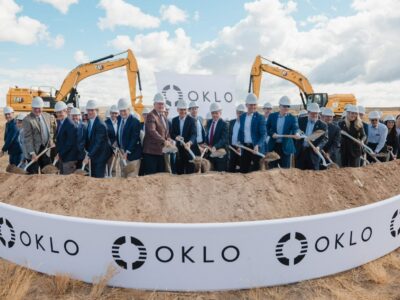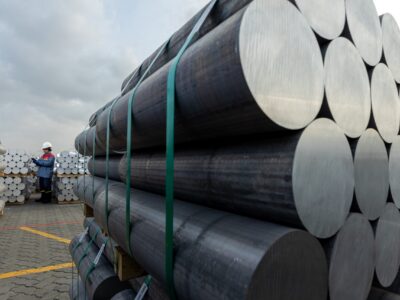On Friday, October 17, Senator John Curtis (R-UT) hosted the 4th Annual Conservative Climate Summit at the University of Utah. As always, the event emphasized that conservatives and Republicans should and do care about climate. As he described the event in his newsletter, “It’s primarily for conservatives, but we have people here from every stripe. And the main point to conservatives is this is a good way to engage, to show how much we do care about leaving the earth better than we found it, and that you don’t have to leave your conservative values behind to do it.” David Ryser, a resident of Sandy, Utah, affirmed Sen. Curtis’ comments in an opinion piece published in Deseret News, “I’ve attended every summit, and Curtis’s goal has been clear: bring conservatives to the table to lead on practical climate solutions.”
“Not only do you not have to give up your conservative credentials to be good at this,” Curtis added, “We actually have some really good ideas,” and, “We’re going to come up with different answers that you typically have seen because we’re conservative.” He told ABC4, “I think it’s important – the word ‘conservative’ is very, very important. It was essential, as we started doing this, that we were differentiating ourselves as a different voice in this space.” He pointed out the importance of having a seat at the table, because, “when you’re not here, people are making decisions for you that you don’t like.” As Heather Reams, President and CEO of the Citizens for Responsible Energy Solutions (CRES) Forum, summarized in a panel at the summit, “The climate changing is a really big challenge globally, and one side of the aisle shouldn’t be solving the problem. Like hard issues, we should be solving the problem by working together in Congress and legislatures.”
With every year’s event, Sen. Curtis wins more conservatives over to the climate cause. “Some of them come, and they fold their arms like that, and they’re very suspicious. And then by the end of the day, they go, ‘I get it,’ and they realize that it’s been a mistake for Republicans to not be engaged, because we care deeply about the Earth,” Curtis described. With 600 people in attendance this year, the potential impact is enormous.
The growth in conservative support for climate issues is also evident in the Conservative Climate Caucus. In 2021, then-Representative Curtis founded the caucus to educate House Republicans on climate policies and legislation that align with their values and to bring Republicans to the table in these discussions. He reminisced, “From the first time I muttered ‘climate’, I’ve been dealing with an uphill battle.” When he first surfaced the idea of the caucus, he added, “My team said, that’s great, John, you’ll get four or five Republicans that will join that. When I left the House of Representatives last year, 85 House Republicans had joined.”
At the summit, Sen. Curtis also shared that his own passion for climate issues came from his father, who “didn’t know it, but he was an environmentalist.” He described, “I remember my father just instilling in me this sense of the grandeur of this earth and how lucky we were to be in Utah.”

Video Courtesy Senator John Curtis
Among the primary topics at the event was America’s energy needs. One of the more prominent attendees, U.S. Secretary of Energy Chris Wright, explained, “We all want a cleaner, healthier world, with a great future for our kids and grandchildren, and we want to energize the world.” He commented, “To build energy, you need to build big things” domestically instead of outsourcing them to other countries with lower environmental standards. “Green is to build these energy-intensive and large physical materials in our own states, with great regulations and great innovation, and in a clean fashion.”
As Sen. Curtis told reporters after last year’s summit, “I believe that there is a solution for energy needs that’s affordable, reliable and clean, doesn’t leave us dependent on another country for fuel and is right in harmony with conservative values.” This year, he stated, “The market is driving three things: affordable energy, reliable energy, and clean energy. And if you think government can out-regulate that, I believe you’re wrong.” Essentially, “We need every electron we can get.” Sen. Curtis also expressed his concerns about the Department of Energy’s recent termination of $7.5 billion in awards to clean energy projects.
CEO and General Manager of Utah Associated Municipal Power Systems (UAMPS), a joint action agency that helps members meet their wholesale power needs, Mason Baker explained that the organization’s strategy is a “portfolio-based approach to developing resources,” which he described as similar to the “all-of-the-above strategy.” Essentially, a diverse mix of resources “can result in the most economic, affordable, long-term, sustainable power supply for the members.” It entails avoiding overreliance on a single approach amid changing administrations every four years, enabling pivots in response to changing weather, and maintaining fuel diversity to meet a quickly escalating energy demand. In a panel discussion, Jayson Branch, vice president of finance at PacifiCorp, detailed how different resources can interplay well together: “We’ve used our thermal resources like coal generation or gas generation. We’ve changed our speeds at which we can ramp those resources up and down… It allows us to integrate more and more renewables, which are obviously free energy resources, into the system.” Sen. Curtis concluded, “I’ve learned along the way that you don’t rule out any energy sector.”
Sen. Curtis addressed some of the criticisms of energy sources, noting that renewables are improving reliability issues by adding storage, that we will solve the cost issues surrounding nuclear, and that “there is a role for fossil fuels in our energy future” with technologies like carbon sequestration and direct air capture. Secretary Wright expressed support for specific technologies, like small modular reactors and power purchase agreements for nuclear. Secretary Wright elaborated, “We are going to see a nuclear renaissance. Utah is absolutely going to be a key part of that… Nuclear’s going to become sexy again.” He added, “I’m also super excited about next-generation geothermal. And frankly, Utah is the leader in that.” Sarah Jewett, senior vice president of strategy at geothermal company Fervo Energy, explained that “geothermal energy is an incredible solution that is not in the future, but it is here today. It is a baseload, reliable solution that is rapidly becoming more affordable… Geothermal power is about to proliferate in a really, really meaningful way, and Utah is the place where that proliferation will begin.”
Permitting and quick project builds were also central topics. UAMPS’s Baker emphasized, “As we think about trying to keep up with the demand that’s coming, we have to get faster at permitting these projects… And once these projects are permitted, we need to have comfort that the permits are going to be honored.” Reneging on permits, like that of Revolution Wind, will create investment uncertainty and ultimately drive prices up. Secretary Wright explained that permitting reform needs to be bipartisan, “Real permitting reform means both of the major political parties come together to discuss what their are, what they think the roadblocks are to development of this infrastructure, and how can we make it easier.” He also advocated for “energy addition, not energy subtraction,” noting, “We’re doing everything we can to get new generation on the grid as fast as possible. We’re doing things to get more power generation out of existing assets.” After attending the event, Sandy, Utah resident Marc Peterson wrote in a letter to the editor published in the Salt Lake Tribune, “I appreciated the focus on building all available technologies as quickly as possible.”

Photo Courtesy Fervo Energy
Among the other topics at the summit were healthy forests and wildfire mitigation. In April, Sen. Curtis introduced the Senate version of the bipartisan Fix Our Forests Act, alongside Senators Tim Sheehy (R-MT), John Hickenlooper (D-CO), and Alex Padilla (D-CA). Among other initiatives, the legislation would establish programs to reduce wildfire risks in high-priority “firesheds,” deploy research and demonstration initiatives for wildfire prevention, detection, and mitigation technologies, create a Wildfire Intelligence Center that would streamline federal response, and expand support for projects that protect forest health and contribute to reforestation. On October 21, the bill advanced through the Senate Committee on Agriculture, Nutrition, and Forestry.
In a panel discussion at the summit, Berkshire Hathaway Energy’s Devlin Daneshforouz explained the importance of the legislation from the utilities’ perspective: “It allows us to do more of the wildfire mitigation work that we need to do, quicker. Wildfire seasons are getting longer, and the periods where we can operate and do the work needed to prevent them from happening are getting shorter.” The company plans to invest more than $2 billion in this type of work by 2027. Matt Weiner, from the nonprofit Megafire Action, added that the average wildfire permitting process takes about 1,000 days, pointing to the Forest Service’s fuel break maintenance strategy, announced in 2020, which took four years to approve. Notably, $9 million of treatment work could have saved $40 billion in damage resulting from this year’s Eaton fire in Los Angeles.
In a call with reporters, Sen. Curtis explained, “It’s about managing our forest in a way that is in harmony with those who definitely want to preserve and protect them, and by the way, count me as one of those. But also in a way that doesn’t tie hands, that helps these people make good decisions and do so quicker.” This is especially essential following the release of the Utah Wildfire Annual Report, which found a 54% increase in wildfires over the past year. At the summit, Sen. Curtis said of the bill’s likelihood of passage, “I think the odds are very, very high.”

Photo Courtesy Megafire Action
Several participants have recognized the importance of the summit. Stewardship Utah’s Eliza Cowie told FOX 13 News, “I think it is an important step in a larger process of addressing our climate solutions.” Carmen Val Dez, senior policy associate with the Healthy Environmental Alliance of Utah, added, “Climate doesn’t impact just one party or the other.”
In his op-ed, Sandy resident David Ryser reflected, “Sen. Curtis deserves credit for involving conservatives in climate discussions. Utahns want leaders who champion innovation, protect our land, and provide energy that is safe, healthy, and economical. By embracing all practical solutions and letting free markets work, conservatives can lead — demonstrating that caring for the land we cherish is a truly conservative principle.”
As Sen. Curtis summarized after the event, “The Conservative Climate Summit continues to show that conservatives are leading with practical, durable solutions for our environment and economy. Utahns care deeply about clean air, healthy forests, and reliable, affordable energy—and we know those goals are not in conflict. By championing innovation, empowering local communities, and responsible land and resource management, we can protect what makes Utah special without sacrificing our prosperity. The summit is about action over ideology, and this year’s program proved no different.”
In his letter to the editor, Sandy resident Marc Peterson concluded, “In a time when ‘genuine respect’ can feel rare, gatherings like the Conservative Climate Summit show how much we can accomplish when we engage each other with civility and shared purpose.”





